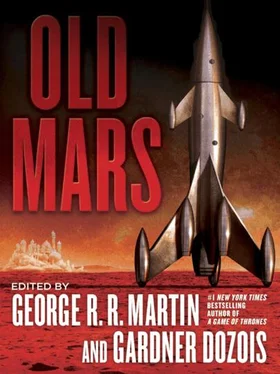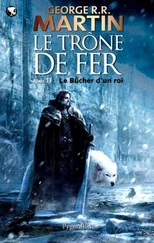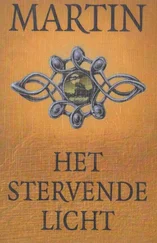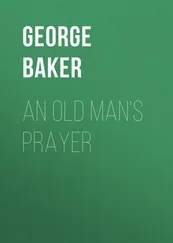“Seems supercumbersome. What if you were a Martian that couldn’t sing? Would you be like a mute?”
Tilda laughed, happy to find herself able to laugh after so many weeks of tension. “That’s a really interesting question.”
“That’s me, all interesting questions, and no answers,” Ali said. He had a nice smile. “What do you want to do now?”
“I should probably get back,” Tilda said halfheartedly.
“And I’ve got a pressure tent, and Mom put up a lunch for us. How about the Face? We can quote ‘Ozymandias’ to each other.”
The flight took another hour. From the air, the Face was massive and easily discerned, the blank eyes frowning up at the red sky, mouth set in an uncompromising line. Once they landed, it appeared as just sheer red cliffs. Something that could be seen from space had to be too large to grasp from ground level.
“Wonder how they carved it?” Ali asked, as they set up the tent.
“Must have been aerial,” Tilda said. “Lasers from above to cut away the rock.”
“I’d hate to be the guy who missed the dotted line,” Ali said as he hit the oxygen canister. Tilda set up a small heater, and, with a sigh of relief, removed her helmet.
Mrs. Al-Jahani was a wonderful cook, and she had packed baba ghanoush and curried chicken, both choices wrapped in tender pita bread. There was baklava dripping with honey for dessert. Fortunately, bees had taken well to the life in the Martian domes. Which was good, they had pretty much vanished on Earth.
Ali seemed nervous as he packed up the picnic basket. “I was thinking, I’m going to be in Paris. You’ll be at Cambridge. Not that far apart. Maybe we can … get together.”
“I’d like that,” Tilda said, and suddenly the handsome, dark-haired Ali presented himself as potential boyfriend material. She’d have to think about that, but right now it gave her a warm, tingly glow.
They replaced their helmets, and broke down the tent, and stowed it back in Ali’s ultralight. They then went to the side of the Face. Somewhere in the recent past, some human had carved steps into the side of the mammoth statue. Tilda felt guilty as she clambered up but ultimately shrugged and accepted it. She hadn’t done it, and it was too late to undo it.
On top, they walked across the massive chin, across the cheek, and stood looking down into the notch of the left eye.
“I wonder who he was,” Tilda said softly.
“And that’s why they should have left written records,” Ali said. He paused, then added, “Hey, you want to come back to our place for supper?”
Tilda thought about the morose silence that held court at the McKenzie table and nodded happily. “I’d like that, thanks. I’ll radio home and let them know once we get in the air.”
“Which we’d better do,” Ali said, squinting at the distant, setting sun.
Noel-Pa gave her permission, but his voice sounded stretched and thin. She hoped that he and Daddy-Kane hadn’t had another argument.
The sun, small and distant, sank below the horizon. The moons of Mars rose and passed each other as they raced in opposite directions across the sky. Without the cushion of deep atmosphere, the stars seemed fingertip close. As if by agreement, they flew in silence, soaking in the moment. Eventually, the farm domes came into view, glittering like captured stars on the horizon. The towers of the Martian city formed shadow fingers, stretching as if to capture the stars and moons.
Dinner at the Al-Jahani house was loud, delicious, slightly disorganized, and very fun. Mrs. Al-Jahani’s face was like an exquisite cameo set in the frame of her headscarf. Mr. Al-Jahani held their youngest child, little Jasmine, on his knee. Ali’s two younger brothers surreptitiously punched and pinched each other, and Siraj, his merry black eyes alight with mischief, kept up a singsong of “Ali’s got a girlfriend.” Which eventually earned him a punch from his elder brother.
It all reminded Tilda of the cheerful, cozy family dinners she’d enjoyed with her fathers before they had moved to Mars. Wistfully, she wondered what it would have been like if the men had crèched a little brother or sister for her, but she knew that such technology was expensive on a military officer’s salary. Still, it might have made a difference now. Maybe one of these imaginary siblings would have wanted to be a farmer and mollified Grandpa Stephen.
After dinner, they played mahjong and Scrabble, much to the disgust of the younger boys, who had wanted to load up a SimGame and shoot aliens. When Jasmine fell asleep in her mother’s arms, Tilda knew it was time to go. Ali walked her back out to her ultralight and briefly clasped her hand.
“This was fun. Thanks for spending the day with me,” he said softly.
Tilda, studying the line of his cheek, and his mouth with its rather lush lower lip, thought how, on Earth, he would have leaned forward and kissed her now, but here they were separated by their helmets. She settled for giving his hand a tight squeeze.
“Thanks for inviting me. I had a wonderful time.”
“We’ll do it again before we leave.” He got an arm around her and gave her a hug, which Tilda enthusiastically returned. She then climbed into the ultralight and made the short hop over the canal that separated the two farmsteads.
She was surprised to find both her fathers waiting for her in the cavernous living room. She noticed that Noel-Pa was paler than usual, holding his face so still that he seemed more like a marble statue than a living man. Daddy-Kane put an arm around her shoulders and guided her to the sofa, but she noticed that he never looked directly at her.
Then he began to talk, and with each word that Daddy-Kane spoke, Tilda felt herself dying. She wanted to scream, run, cry, batter at the stone walls that seemed to be drawing closer and closer. She hunched over, folding around the agony in her heart.
“But … but I don’t want to study agronomy,” she finally said. It was an effort to force out the words through a throat that ached with unshed tears. She mustered a smile. “I’m terrible with plants, Daddy, you know that. I killed a ficus , for heaven’s sake!”
Always before, Daddy-Kane had responded to her teasing. This time, he remained stone-faced.
“You’re a McKenzie. We grow things.”
“And some of us kill things.”
Tilda’s eyes darted to her other father, and she was terrified by what she saw in Noel’s face as he looked at his husband.
Kane’s head jerked up and his eyes narrowed as he looked at Noel. “Well, that was certainly threatening.”
“All I meant was that I was a soldier. Why aren’t you pushing her to enlist? Why does it have to be your family tradition that she follows?”
“You said it yourself—you kill things.” Kane’s tone was nasty. “I want something different for her.”
Tilda stood and laid a shaking hand on Kane’s arm. “And I want something different for me too, but it should be what I want. I want to study philosophy and comparative religion. I want to understand the Martians, and the ice creatures on Europa. Please, Daddy.” Her voice caught on the final words, and she feared she sounded like a five-year-old.
“The Martians are dead. The creatures on Europa may not even be intelligent, and all you’ll be able to do with that degree is teach,” Kane said.
“And what’s so wrong with that?” Noel snapped.
“It’s useless and pointless.” Kane’s breaths were ragged and harsh. Kane looked down at Tilda. “Until your majority, your grandfather and I pay the bills and set the rules. You’re going to Lowell College. Classes start in five weeks.”
It was the harsh tone more than the words that finally broke her control. Tilda gasped out a single sob and bolted from the room.
Читать дальше












